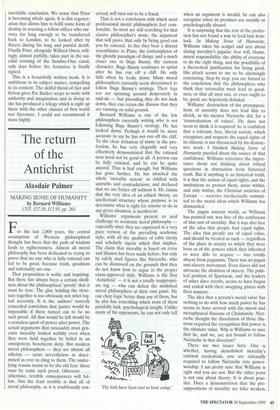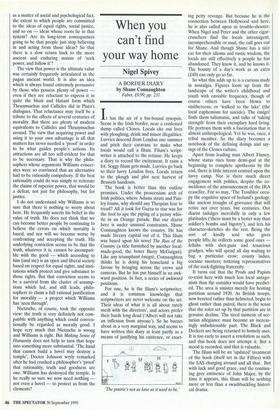The return of the Antichrist
Alasdair Palmer
MAKING SENSE OF HUMANITY by Bernard Williams CUP, £57.50, £12.95, pp. 263 For the last 2,000 years, the central assumption of Western p,hilosophical thought has been that the path of wisdom leads to righteousness. Almost all moral philosophy has been dedicated to trying to prove that no one who is fully rational can fail to be good, because truth, goodness and rationality are one.
That proposition is noble and inspiring. But there has always been a certain shrill- ness about the philosophical `proofs' that it must be true. The glue holding the struc- ture together is too obviously not strict log- ical necessity. It is the authors' scarcely concealed conviction that justice would be impossible if there turned out to be no such proof. All that would be left would be a ceaseless quest of power after power. The actual arguments that rationality must gen- erate morality looked wobbly even when they were held together by belief in an omnipotent, beneficent deity. But modern moral philosophers — they are almost all atheists — seem nevertheless as deter- mined as ever to cling to them. The under- lying reason seems to be the old fear: there must be some such proof. Otherwise . . . otherwise, terrible consequences will fol- low. Not the least terrible is that all of moral philosophy, as it is traditionally con-
ceived, will turn out to be a fraud.
That is not a conclusion with which most professional moral philosophers feel com- fortable. So most are still searching for that elusive philosopher's stone, the argument that will prove that only by being good can you be rational. In this they bear a distant resemblance to Plato, the contemplator of the ghostly paradigm of things, and a much closer one to Bugs Bunny, the cartoon character. Bugs Bunny continues to sprint after he has run off a cliff. He only falls when he looks down. Many moral philosophers currently seem determined to follow Bugs Bunny's strategy. Their legs too are spinning around desperately in mid-air — but providing they do not look down, they can retain the illusion that they are running on solid ground.
Bernard Williams is one of the few philosophers currently writing who is not following Bugs Bunny's strategy. He has looked down. Perhaps it would be more accurate to say he has not run off the cliff. To the clear irritation of many in the pro- fession, he has very elegantly and very effectively demonstrated that the rational man need not be good at all. A person can be fully rational, and he can be quite amoral. That is bad enough, but Williams has gone further. He has attacked the whole `morality system' as riddled with untruths and contradictions, and declared that we are better off without it. He claims that the very idea of an ethical theory, an intellectual structure whose purpose is to determine what is right for anyone to do in any given situation, is incoherent.
Williams' arguments present an acid challenge to academic moral philosophy especially since they are expressed in a very pure version of the prevailing academic style, with all the qualities of calm clarity and scholarly rigour which that implies. The claim that morality is based on error and illusion has been made before, but only by safely mad figures like Nietzsche, who can be dismissed on the grounds that they do not know how to argue in the proper exam-approved style. Williams is the first `Antichrist' — it is not a totally inappropri- ate tag — who can defeat the analytical moral philosophers at their own game. He can chop logic better than any of them, but he also has something which most of them painfully lack: psychological insight. Unlike many of his opponents, he can not only tell
The kids have been sent to boot camp.'
when an argument is invalid, he can also recognise when its premises are socially or psychologically absurd.
It is surprising that the rest of the profes- sion has not found a way to feed him hem- lock. In Making Sense of Humanity, Williams takes his scalpel and sets about slicing morality's jugular: free will, blame, moral responsibility, the ability of everyone to do the right thing, and the possibility of a theoretical justification for being good. His attack seems to me to be alarmingly convincing. Step by step, you are forced to the conclusion that the philosophers who think that rationality must lead to good- ness, or that all men can, or even ought to be, good, are hopelessly deluded.
Williams' destruction of the presupposi- tions of morality does not lead him to shriek, as his mentor Nietzsche did, for a `transvaluation of values'. He does not seem to think it is required: he is confident that a tolerant, free, liberal society, which recognises and respects the equal rights of its citizens, is not threatened by his destruc- tive work. I finished Making Sense of Humanity puzzled about the source of that confidence. Williams reiterates the impor- tance about not thinking about ethical questions in abstraction from historical truth. But if anything is an historical truth, it is that the notion of equal rights, and the institutions to protect them, arose within, and only within, the Christian societies of Europe — societies intellectually commit- ted to the moral ideas which Williams has dismantled.
The pagan ancient world, as Williams has pointed out, was free of the confusions of that sort of morality. But it was also free of the idea that people had equal rights. The idea that people are of equal value, and should be treated as such — regardless of the place in society to which they were born or of the powers which they inherited or were able to acquire — was totally absent from paganism. There was no pagan anti-slavery movement. Even slaves did not advocate the abolition of slavery. The polit- ical position of Spartacus, and the leaders of other slave revolts, seems to have begun and ended with their swapping places with their masters.
The idea that a person's moral value has nothing to do with how much power he has seems to have arrived with the moral and metaphysical illusions of Christianity. Niet- zsche thought the dissolution of those illu- sions required the recognition that power is the ultimate value. Why is Williams so sure that he, and we, are not bound to follow Nietzsche in that direction?
There are two issues here. One is whether, having demolished morality's rational credentials, you are rationally required to follow Nietzsche into power- worship. I am pretty sure that Williams is right and you are not. But the other point is not one about theory. It is about prac- tice. Does a demonstration that the pre- suppositions of morality are false weaken, as a matter of social and psychological fact, the extent to which people are committed to the ideas of equal rights, social justice, and so on — ideas whose roots lie in that system? Are its long-term consequences going to be that people just stop believing in and acting from those ideas? So that there is a slow return back to the more ancient and enduring maxim of 'seek power, and follow it'?
The view that power is the ultimate value was certainly frequently articulated in the pagan ancient world. It is also an idea which is always found extremely persuasive by those who possess plenty of power even if they are reluctant to express it in quite the blunt and blatant form which Thrasymachus and Callicles did in Plato's dialogues. That reluctance may itself be a tribute to the effects of several centuries of morality. But there are plenty of modern equivalents to Callicles and Thrasymachus around. The view that acquiring power and using it to your own advantage is all that matters has never needed a 'proof' in order to be what guides people's actions. Its attractions are all too self-evident for that to be necessary. That is why the philo- sophers whose arguments Williams eviscer- ates were so convinced that an alternative had to be rationally compulsory. If the best rationality could do was simply to reiterate the claims of superior power, that would be a defeat, not just for philosophy, but for justice.
I do not understand why Williams is so sure that there is nothing to worry about here. He frequently asserts his belief in the value of truth. He does not think that we can become better people by continuing to believe the errors on which morality is based, and nor will we become worse by confronting and accepting the truth. His underlying conviction seems to be that the truth, whatever it is, cannot be incompati- ble with the good — which according to him (and me) is an open and liberal society based on respect for equal rights, and insti- tutions which protect and give substance to those rights. But that conviction seems to be a survival from the cluster of assump- tions which led, and still leads, philo- sophers to claim a full rational justification for morality — a project which Williams has 'seen through'.
Nietzsche, of course, took the opposite view: the truth is very definitely not com- patible with anything which could conven- tionally be regarded as morally good. I hope very much that Nietzsche is wrong and Williams is right. But Making Sense of Humanity does not help to turn that hope into something more substantial. 'The hand that cannot build a hovel may destroy a temple', Doctor Johnson wryly remarked after he had crushed a philosopher's 'proof that rationality, truth and goodness are one. Williams has destroyed the temple. Is he really so sure we now need nothing not even a hovel — to protect us from the elements?



































































 Previous page
Previous page